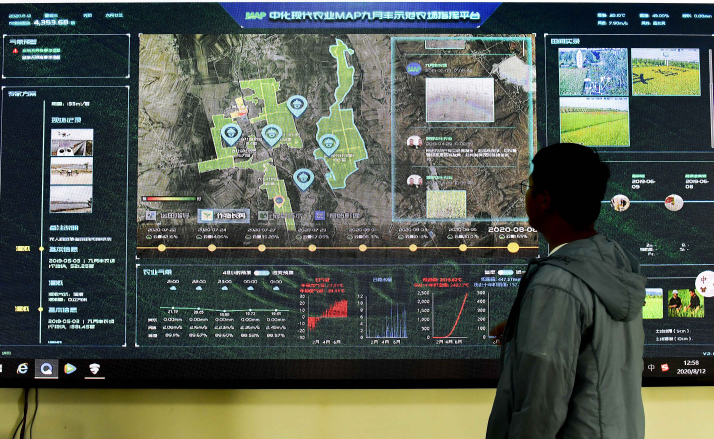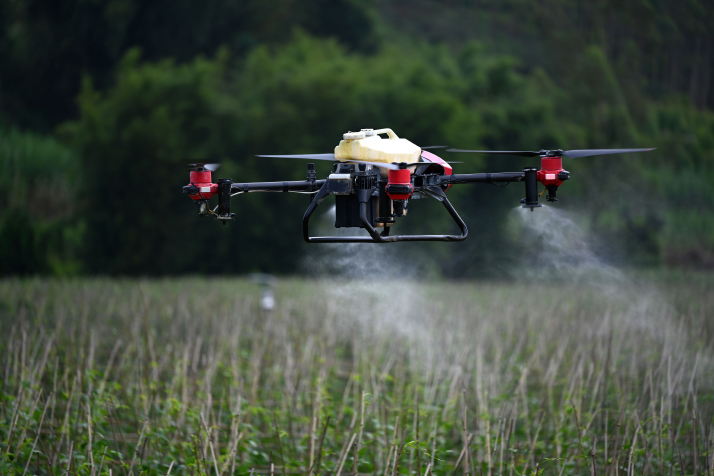|
||||||
|
||||||
| Home Nation World Business Opinion Lifestyle China Focus ChinAfrica Video Multimedia Columnists Documents Special Reports |
|
||||||
|
||||||
| Home Nation World Business Opinion Lifestyle China Focus ChinAfrica Video Multimedia Columnists Documents Special Reports |
| Nation |
| Science and technological advancement is the key to China's agricultural development |
| By Lu Yan · 2021-01-08 · Source: NO.2 JANUARY 14, 2021 |
 A staff member checks plant growth based on satellite images and data on a large screen at a family farm in Yongji County, Jilin Province in northeast China on August 12, 2020 (XINHUA)
In December 2020, a new type of apple, named "the Super Apple," debuted at supermarkets across China. Before reaching the market, the product had undergone over 500 tests by Geneva-headquartered SGS, a multinational inspection, verification, testing and certification service provider, showing no signs of pesticide residue. Produced in Luochuan, Shaanxi Province in northwest China, one of the country's premier apple producing areas, the apples are sweeter than regular ones. The apple's quality is ensured via targeted nutrition and other quality improvement plans, which is based on analysis of the apple growing condition, including the health of the soil. Blockchain technology is applied in documenting farmers' operations so as to avoid nonstandard pesticide use. Digital fruit sorting technology at the apple storage warehouse facilitates the grading of apples to ensure stability in the quality of the apples. All apples taken to market are sweet and juicy. Sang Yanhai, a 42-year-old apple grower in Luochuan, has seen growing apple yield and increasing income. "I used to feel jealous when I saw imported apples that were labeled with a higher price at supermarkets, but now I believe that apples we grow are equally good," Sang said. The key to the apple's good quality is science and technology. "The future of agriculture lies in modern technology," Huang Jikun, Director of the China Centre for Agricultural Policy at Peking University, told Beijing Review.  A drone dusts green beans with pesticide at a farm in Wangmei Village, Guangxi Zhuang Autonomous Region in south China, on September 20, 2020 (XINHUA)
Making progress At China's Central Rural Work Conference, held in Beijing from December 28 to 29, 2020, President Xi Jinping stressed that with China at the historical juncture of marching toward its second centenary goal, which is to build a modern socialist country, a number of tasks are currently essential and deserve the full attention of the Communist Party of China (CPC). These are the tasks of consolidating and extending China's poverty alleviation achievements, advancing comprehensive rural vitalization, and accelerating the modernization of the agricultural sector and rural areas. Xi said efforts must be made to increase the efficiency and quality of the agricultural sector, make rural areas desirable places to live and work in, and ensure that farmers are well-off. Xi also underlined the importance of speeding up breakthroughs on core and key agricultural technologies. Song Hongyuan, former head of the Research Center for the Rural Economy at the Ministry of Agriculture and Rural Affairs (MARA), said that China's agriculture has entered a stage of high-quality development, as the country is meeting the need of an increasing number of more demanding customers for quality agricultural products. However, high-quality produce is currently in shortage, while the supply of basic and bulk agricultural products exceeds demand. "Accordingly, agriculture should turn to technology," Song said at a forum on rural vitalization held by Peking University in Beijing in December 2020. On the southern margin of the Taklimakan Desert in Kashgar Prefecture, Xinjiang Uygur Auto-nomous Region in northwest China, there is a 20-hectare piece of saline-alkali land for growing rice. The land, located close to the farthest point in the world from the ocean, used to be too poor to support vegetation due to its severe salinity. Three years ago, Yuan Longping, a renowned agronomist, dubbed China's "father of hybrid rice," led a trial program of planting rice in saline-alkali soil in areas including Xinjiang and Heilongjiang Province in northeast China. Through genome sequencing technology, scientists in Yuan's team have been able to nurture improved rice varieties that can grow in saline and alkaline soils like those in Kashgar. The scale of this field experiment has been expanding over the past three years, and rice varieties are constantly improving. Yuan said he hoped that China could soon put 6.67 million hectares of saline-alkali soil into rice production, which would be very likely to boost the country's total rice yield by around 30 million tons. "That is equal to the annual grain output of Hunan Province in central China," said Yuan, who turned 90 in September 2020. "It can help feed over 80 million people, which will be a huge contribution to the country's food security." In addition, quality rice from saline-alkali soils is full of micronutrients, and its content of calcium, iron, protein and potassium is significantly higher than that of ordinary rice. Also, since the rice grows in the harsh conditions of saline-alkali soils, it rarely suffers from the common diseases and insect pests that cause problems in the productions of ordinary rice. The rice therefore does not generally require pesticides, satisfying demand from customers for nutritious and healthy food. Whole process mechanization has helped farmers in Jianyang, a town in southwest China's Sichuan Province. Zheng Huaming, the manager of a local production base for vegetable mechanization, takes radish production as an example: The entire production process for 30 hectares of land, from sowing to harvesting, can be completed by fewer than 10 people. Additionally, while standard production techniques allow for two radish harvests per year, whole process mechanization allows Jianyang farmers to make three. "Without machines, cleaning and truck loading 10 tons of radishes require 50 farmers working for an entire day, while now it only takes eight farmers less than half a day," Zheng said. Smart agriculture has been promoted across the countryside in China. Another example is the thousands of intelligent fertilization systems that have been developed by Join Hope, a Chinese modern agricultural technology company in Xinjiang. Farmers can use a smartphone app to remotely set fertilizer application times, amounts and other settings of machines installed on their land. According to the company's statistics, the smart system not only saves labor and time, but also helps conserve water and fertilizer, and increases yield. Similarly, one can rarely see farmers working at any orchard in Lushui, Yunnan Province in southwest China. All regular tasks, including irrigation, fertilizer application, environmental monitoring, surface meteorological observation and insect pest control are completed automatically. Data gathered by the system are analyzed to improve future production. "The advantages of non-contact farming and digital technology have been increasingly evident, especially during the novel coronavirus disease pandemic," said Chen Zhigang, International Dean of the China Academy of Rural Development at Zhejiang University. Policy and talents A plan to push forward the digitalization of agricultural development and rural governance was unveiled jointly by the MARA and the Office of the Central Cyberspace Affairs Commission in January 2020. According to the plan, digital technology will see faster integration with the agricultural industry and that the proportion of the agricultural industry involved in the digital economy would increase. By 2025, the agricultural digital economy should account for 15 percent of the value added within China's agricultural sector. Hundreds of modern agricultural technology demonstration bases have been built across the country. According to the MARA, advanced technologies, high caliber technological talents, and sustainable mechanisms are encouraged to gather at these bases to conduct trials. Successful operations and experience will be summarized as models for other villages to learn from. Building infrastructure is the primary task in advancing agricultural technology, and national and provincial agricultural information and technology research and development centers should be established so that basic data and big data can be improved, and technologies like 5G and the BeiDou Satellite Navigation System can be applied in the field, said Han Fujun, Deputy Chief Engineer of the Information Center of MARA while addressing the forum at Peking University. Han believes it is crucial to nurturing agricultural technology talents who can develop technologies that are easy for farmers to use. Since 2010, the Chinese Government has been implementing policies to identify and support agricultural technology talents. Outstanding individuals and teams can receive funds for several successive years for major scientific projects. Honorary titles and awards have been established as incentives and rewards for their achievements. Technology exchanges, training, field inspection trips and other activities are organized for them to better understand the specific situations of each rural area. The application of agricultural technology also creates new forms of employment, such as drone operators for dusting pesticides, and agricultural professional managers who provide organizational, operational and technical support services for farmers. Yuan Ning is a farm drone operator. He said that compared with traditional plant protection, dusting pesticides with a drone can improve the efficiency of pesticides and prevent accidental overuse that occurs from time to time in traditional planting. "I need to be proficient in both drone technology and agricultural knowledge. Any mistake in the flight altitude and speed of drones, or the selection of pesticides and their ratio, will affect the final results of pest management," Yuan told People's Daily. Potential Huang said that some companies face difficulties in protecting the intellectual property rights (IPRs) of their agricultural scientific innovations. "The technology they devote their hard work to might be copied by some smaller companies, dampening research and development enthusiasm in the long run," he told Beijing Review. Huang said the government should come up with additional mechanisms and policies to protect the IPRs of companies. Also, it should support basic research and create an environment for information sharing. Companies can play a bigger role in biotechnology, information technology, equipment technology and other high-end technology. With their sensitivity to the market, they can survey the needs of farmers and develop more practical products for improving productivity, the quality of produce, and eventually the income of farmers. Chen said that the application of digital technology in agriculture lags far behind that of other industries. The application of digital technology enjoys great potential in agriculture, but to further promote its development, there are still some issues to solve, such as unbalanced regional development. "Also, technology might exclude certain groups of people, so making technological results available and easily accessible to all is something we need to be concerned about," Chen said. Fan Shenggen, a professor at China Agricultural University, believes that due to the pandemic, companies have begun rethinking the sustainability of the current agricultural model, as increasing numbers of people want to eat healthier and more nutritious foods. "For example, they might want to eat less meat and more organic food, local food, and natural and holistic products, as well as to promote regenerative agriculture," he said, adding that this change will give science and technology more room for further development. (Print Edition Title: Wings of Technology) Copyedited by Garth Wilson Comments to luyan@bjreview.com |
About Us | Contact Us | Advertise with Us | Subscribe
|
||
| Copyright Beijing Review All rights reserved 京ICP备08005356号-7 京ICP备08005356号-10 京公网安备110102005860号 |